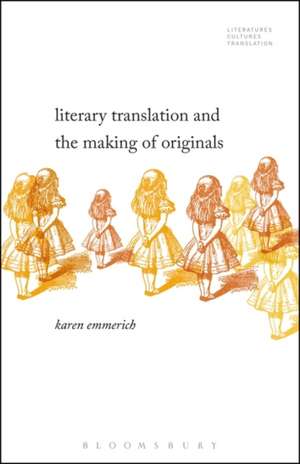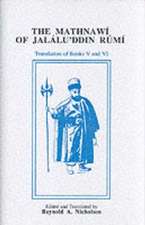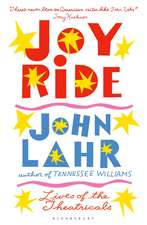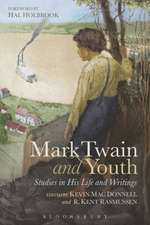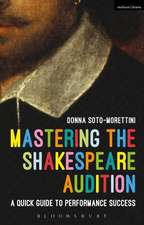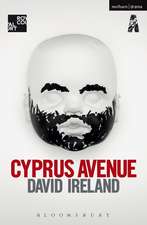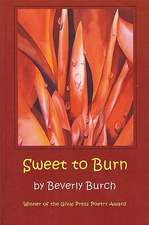Literary Translation and the Making of Originals: Literatures, Cultures, Translation
Autor Dr. Karen Emmerichen Limba Engleză Paperback – 20 sep 2017
| Toate formatele și edițiile | Preț | Express |
|---|---|---|
| Paperback (1) | 190.06 lei 6-8 săpt. | |
| Bloomsbury Publishing – 20 sep 2017 | 190.06 lei 6-8 săpt. | |
| Hardback (1) | 771.91 lei 6-8 săpt. | |
| Bloomsbury Publishing – 20 sep 2017 | 771.91 lei 6-8 săpt. |
Preț: 190.06 lei
Preț vechi: 221.76 lei
-14% Nou
Puncte Express: 285
Preț estimativ în valută:
36.37€ • 38.07$ • 30.27£
36.37€ • 38.07$ • 30.27£
Carte tipărită la comandă
Livrare economică 31 martie-14 aprilie
Preluare comenzi: 021 569.72.76
Specificații
ISBN-13: 9781501329906
ISBN-10: 1501329901
Pagini: 232
Ilustrații: 6 b/w illustrations
Dimensiuni: 140 x 216 x 18 mm
Greutate: 0.27 kg
Editura: Bloomsbury Publishing
Colecția Bloomsbury Academic
Seria Literatures, Cultures, Translation
Locul publicării:New York, United States
ISBN-10: 1501329901
Pagini: 232
Ilustrații: 6 b/w illustrations
Dimensiuni: 140 x 216 x 18 mm
Greutate: 0.27 kg
Editura: Bloomsbury Publishing
Colecția Bloomsbury Academic
Seria Literatures, Cultures, Translation
Locul publicării:New York, United States
Caracteristici
Unlike much writing in translation studies, this book is written by a scholar of literature and translation with many years of experience as a translator of literature; it thus engages theoretical discussions from a perspective that does not dismiss but rather recognizes and draws on the practical expertise of translators themselves
Notă biografică
Karen Emmerich is Assistant Professor of Comparative Literature at Princeton University, USA. She has published eleven books of Greek literature in translation and her academic work has appeared in journals such as Comparative Literature, Arion, Translation Studies, and the Journal of Modern Greek Studies.
Cuprins
AcknowledgmentsIntroduction: Difference at the "Origin," Instability at the "Source": Translation as Translingual Editing1. "A message from the antediluvian age": The Modern Construction of the Ancient Epic of Gilgamesh2. "Monuments of the Word": Translation and the Textualization of Modern Greek Folk Songs3. On Manuscripts, Type-Translation, and Translation (Im?)proper: Emily Dickinson and the Translation of Scriptural Form4. The Unfinished Afterlives of C. P. Cavafy5. 'The Bone-Yard, Babel Recombined': Jack Spicer and the Poetics of Citational CorrespondenceCoda: Toward a Pedagogy of IterabilityBibliography Index
Recenzii
Emmerich's engaging essays demonstrate how editorial choices help construct texts as monuments: allegedly permanent, enduring artifacts that demand preservation and honor, not interpretation or discussion about their fraught histories as oral texts or written documents.
This book is long overdue. Karen Emmerich's focus on the shaping effect translation has on originals is not only unique but compelling, and she writes in a lively, accessible, and everywhere intelligent style that makes every line a pleasure to read.
Karen Emmerich's study gives sustained attention to a topic so central to translation yet largely neglected in translation research. To treat editing as an interpretive act that constructs texts for further use redefines basic concepts like the source text, authorship, even translation itself. This book promises to direct the field into productive new directions.
By combining textual studies with translation practice, Emmerich confronts a number of inconvenient facts about translation that lead to some convenient conclusions, which have not often been acknowledged. These include the fact that source texts in the original language are unstable and have often been revised or damaged in republication; the fact that translations, just like originals, are subject to contingencies of publication; and, most important, the fact that while the translation is supposed to be the same work as the original, it is always in fact one hundred percent different from the original. A translation is both the same and different from ... from what? Emmerich asks. Textual instability dogs both original and translation, which are simultaneously the same but different and are subject to the play of personalities and production contingencies. Translation is newly creative, entailing gain as well as loss.
Literary Translation and the Making of Originals should be essential reading for literary translators, translation scholars, and professors, especially those who teach literary translation. It will also be of interest to devotees of translated literature.
Karen Emmerich's new book Literary Translations and the Making of Originals is a brilliant contribution to the arena of textual criticism, translation theory, and practice. Drawing on her own extensive experience in translating from Greek and Spanish, she presents an innovative and creative approach to "translation as translingual editing," where translators both negotiate existing versions of a certain work and create a new version of their own in the translated work's textual history.
This book is long overdue. Karen Emmerich's focus on the shaping effect translation has on originals is not only unique but compelling, and she writes in a lively, accessible, and everywhere intelligent style that makes every line a pleasure to read.
Karen Emmerich's study gives sustained attention to a topic so central to translation yet largely neglected in translation research. To treat editing as an interpretive act that constructs texts for further use redefines basic concepts like the source text, authorship, even translation itself. This book promises to direct the field into productive new directions.
By combining textual studies with translation practice, Emmerich confronts a number of inconvenient facts about translation that lead to some convenient conclusions, which have not often been acknowledged. These include the fact that source texts in the original language are unstable and have often been revised or damaged in republication; the fact that translations, just like originals, are subject to contingencies of publication; and, most important, the fact that while the translation is supposed to be the same work as the original, it is always in fact one hundred percent different from the original. A translation is both the same and different from ... from what? Emmerich asks. Textual instability dogs both original and translation, which are simultaneously the same but different and are subject to the play of personalities and production contingencies. Translation is newly creative, entailing gain as well as loss.
Literary Translation and the Making of Originals should be essential reading for literary translators, translation scholars, and professors, especially those who teach literary translation. It will also be of interest to devotees of translated literature.
Karen Emmerich's new book Literary Translations and the Making of Originals is a brilliant contribution to the arena of textual criticism, translation theory, and practice. Drawing on her own extensive experience in translating from Greek and Spanish, she presents an innovative and creative approach to "translation as translingual editing," where translators both negotiate existing versions of a certain work and create a new version of their own in the translated work's textual history.
